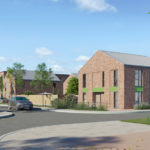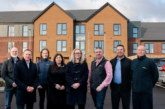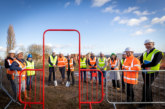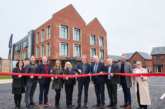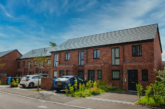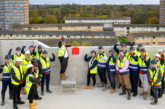 As ForHousing unveils its commitment to ensuring all its new-build homes are net zero, Nigel Sedman, Executive Director of Homes, reflects on six ways the progressive social landlord is ensuring its homes are future-proof.
As ForHousing unveils its commitment to ensuring all its new-build homes are net zero, Nigel Sedman, Executive Director of Homes, reflects on six ways the progressive social landlord is ensuring its homes are future-proof.
We all have our part to play in protecting our planet. The recent COP27 climate summit, which I followed closely, has really brought the urgency of the situation home to me.
The housing sector needs to bring decarbonisation back up the agenda and refocus on meeting the Government’s net zero targets.
Building more new, affordable homes is essential to tackling the housing crisis. But, with housing representing approximately 14% of the UK’s carbon emissions, it is vital we increase housing stock in a responsible and sustainable way too, for the tenants of the future.
Over the past nine years, we have built more than 1,500 affordable homes across the North West across a range of tenures, including more than 1,000 homes in Salford alone, and invested over £145m into the region.
We have ambitions to build more than that number again by 2026 — 1,800 additional and much-needed, quality homes to help make more things possible for more people. To help meet demand for affordable housing, as much as 60% of what we build will be available for Social Rent. But, importantly, 100% will be net zero.
Six ways to make future-ready, net zero homes
- Redefine the standards for new-builds
We have committed to ensuring all of our new-builds will be EPC Band A, net zero homes from now on. This means that all new homes we build will include high levels of insulation, air source or electric heating, and hot water storage and electric vehicle chargers will come as standard. All of this means these properties will never need to be retrofitted. - Increase the energy efficiency of existing homes
Retrofitting is essential to ensure existing homes are more sustainable, driving down energy bills for tenants and ensuring we leave no one behind. We are committed to getting all existing homes we own or manage up to at least EPC Band C standard by 2030. - Embrace change and new technology
Technical advancements can improve efficiencies in all sorts of ways, which is why we are increasingly using modern methods of construction (MMC) to speed up build time, improve quality and support energy efficiency.
We’re piloting alternative heating sources to gas now to meet the Government’s 2025 target for replacing gas as the energy source in new-build homes.
We always try to use innovative but standardised building components that are readily available, to reduce future maintenance costs and minimise disruption to tenants if repairs are needed.
We’re installing smart technology into homes, not only to smooth the transition to digital asset management, but also to give us better insight into how tenants use energy and how they could make savings.
We want to invest in high-quality homes that are ready for the future and new technology can help us achieve that. - Maximise funding opportunities
Recognising the funding challenges of decarbonisation is vital to succeeding in our net zero mission. We expect upgrades to homes to increase build costs per property by up to £15,000, so we need to anticipate this and make the most of funding opportunities. Factoring in grants improves our capacity to fund new homes. Retrofitting existing homes brings cost challenges too which is why we are working with partners on both fronts to secure new funding through key government programmes. - Form partnerships to achieve more together
We recently teamed up with retrofit advisor to the sector NetZero Collective and property maintenance service experts Liberty on a £3m project to retrofit 63 bungalows in Irlam. The job included installing new air source heat pumps and photovoltaic solar panels.
NetZero Collective supported us, plus a handful of other landlords via Greater Manchester Housing Providers, with a successful bid to the first wave of the Social Housing Decarbonisation Fund. We secured a combined total of £10.5m from which we put £630,000 towards the Irlam retrofit project. By working together, we really can maximise our impact. - Involve tenants and customers
We’re also taking tenants and customers on the journey with us more than ever before. Decarbonisation work will impact tenants the most, so we want them to feel empowered in knowing they can help future-proof homes. In the summer we launched a 14 member-strong Carbon Community Panel. This will give the tenants and staff involved a voice to inform the organisation’s decarbonisation journey and be directly involved in projects.
We’ve also invested in training for staff and tenants to ensure they have the skills and knowledge they need to promote a more environmentally responsible community. We’ve even launched a children’s computer game on going green and a new climate action podcast that brings regional and national voices together to discuss the key issues.
Build net zero homes now
The housing sector has an important role to play in meeting the Government’s net zero target by 2050. I firmly believe we need to listen to tenants and involve them every step of the way to meet that goal.
We’re really proud that all our new-builds will be net zero homes from now on. Research from Inside Housing shows the sector is behind in delivering EPC Band A homes. This makes our pledge even more necessary.
The time is now to build high-quality, net zero homes that are future-proof, will improve lives and benefit generations to come.
Header image showing what ForHousing’s Hallsworth Road net zero housing scheme is expected to look like once complete. Work to build the scheme is due to start on site early in the new year.

